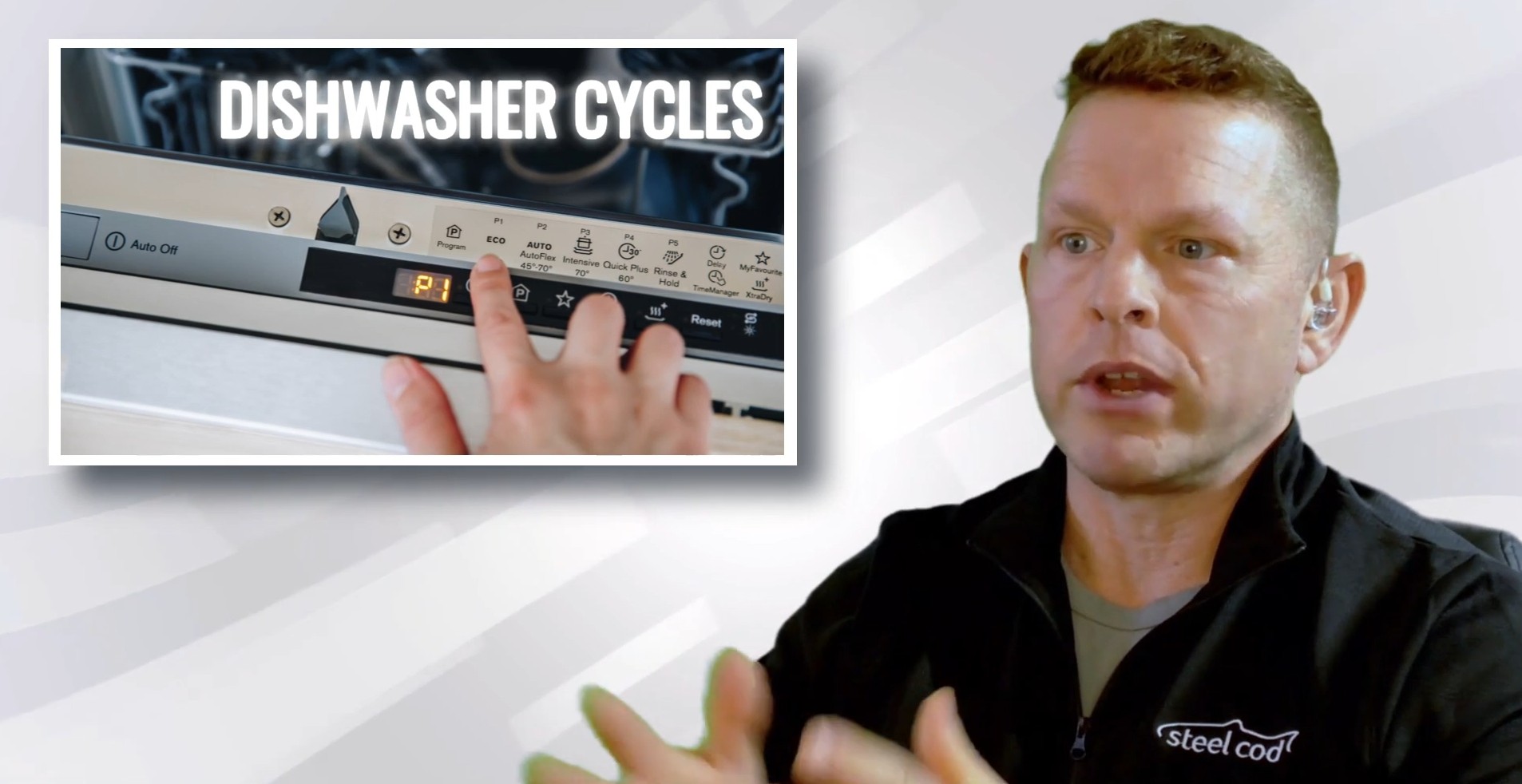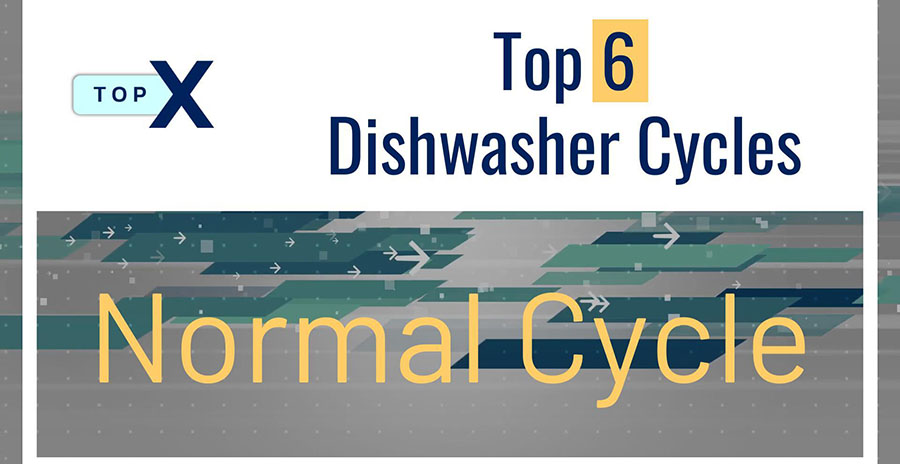Dishwasher Cycles Uncovered
The Dirty Truth About Clean Dishes
Dishwasher Cycles Uncovered
Customers blindly pick cycles without understanding how modern dishwashers optimize cleaning based on load type. The problem? Salespeople aren’t explaining it either. In this episode, we’ll help you decode dishwasher cycles, educate customers, and prevent post-purchase complaints.
Top 6 Dishwasher Cycles
Understanding dishwasher cycles can be overwhelming — for both customers and sales professionals. In this episode of Top X, we follow up this week's The Inside Edge by presenting the top six dishwasher cycles with highlighted examples of premium, mid-tier, and budget dishwashers that feature specialized cycles.
Dishwasher Cycles Uncovered
Customers blindly pick cycles without understanding how modern dishwashers optimize cleaning based on load type. The problem? Salespeople aren’t explaining it either. In this episode, we’ll help you decode dishwasher cycles, educate customers, and prevent post-purchase complaints.
Recap
Key Features & Questions
Do all dishwashers sanitize dishes to some degree, or is the Sanitize Cycle the only way to guarantee bacteria removal?
Only the Sanitize Cycle, reaching temperatures above 150°F, guarantees 99.9% bacteria removal. NSF certification confirms effective sanitization.
Why do certain cycles require specific detergent amounts, and how does overdosing or underdosing impact results?
| Detergent level | Effect |
|---|---|
| Overdosing | Causes residue and clogs filters |
| Underdosing | Weakens cleaning by reducing enzyme activation |
| Optimal | Ensures effective cleaning and protects components |
Are there dishwasher cycles that are completely unnecessary for the average household?
Most households only need Auto, Normal, and Heavy cycles. Specialty cycles are useful for delicate or heavily soiled items but aren’t essential for regular use.
If a customer insists that “all dishwashers work the same,” how do I break through that mindset?
Highlight differences in drying methods, filtration systems, and targeted wash zones. Performance varies significantly across models in cleaning efficiency and drying capability.
How do I handle a customer who assumes the Rinse Only cycle is a waste of water?
Explain that Rinse Only prevents food from hardening and causing odors, using only 1-2 gallons compared to 4-6 gallons for full cycles. It preserves dishes for later cleaning without waste.
How does spray arm design impact cycle effectiveness, and do more arms actually lead to better cleaning?
Effective cleaning depends on spray coverage and pressure, not the number of arms. Enhanced designs improve reach and distribution for better cleaning performance.
What’s the best way to explain why some dishwashers require rinse aid for optimal drying?
Rinse aid helps water sheet off dishes, enhancing drying performance and preventing spots. Particularly critical for condensation drying models.
Which dishwasher cycles are evolving the fastest, and where is the industry headed next?
Auto and Sensor Wash cycles are advancing rapidly, with improved sensors enhancing efficiency by adjusting temperature, water usage, and cycle length based on load conditions.
What’s the next big breakthrough in dishwashing technology, and how will it impact future cycles?
AI-driven sensors are expected to customize wash cycles based on real-time soil detection, improving efficiency and cutting wash times by up to 20%.
Are high-end dishwashers actually better, or do they just offer more customization?
High-end models offer superior filtration, spray design, and drying technology, resulting in better performance, not just more features.
How do different rack designs impact cycle effectiveness, and should customers load differently for different cycles?
Adjustable racks enhance spray coverage and capacity. Proper loading maximizes efficiency, especially when using targeted wash zones or delicate cycles.
Question of the Week
"Have you ever completely changed a customer’s mind about a dishwasher? What did you say that made the difference?"
Dallas Patrick: I'm a bit of a d/washer nerd, LOL, so I always suggest that the d/washer is a science experiment and if elements of your science experiment are not present (or are limited), you will affect the results of your experiment (clean & dry dishes) so you need: Detergent, Temperature, Time & Soil: so if you are pre-washing vs. (pre-rinsing) so less soil, or not using rinse aid (affects drying) or not enough heat (I always recommend using the high temp or sanitize option) as hotter water always cleans better (got (albeit be mindful of delicate crystal or fine china etc) you will get betterer results. also if folks open the door prior to the d/washer's drying cycle being completed you will affect the drying results.
Joe Spivey: Laying out the features and allowing them to see them on paper for us to review.
Angela Warner: I listen first then educate and tie back the features back to that customer. I am big on educating my customers to build value.
Conner Jones: Mostly talking about the different drying systems.
Richard Russell: Everyone has this mentality that Bosch is the only good dishwasher. They are pretty amazing but there are numerous models that in my opinion are just as good if not better. It really depends on the home owner and their needs for the dishwasher. You ask questions to determine where they need to be and how they are going to use the appliance, and find a model that best fits what they want.
Chris Sentz: I know the price is a bit higher than you would like to spend, but as much as we like you I would prefer not to see you in five years replacing it again.
Sara: I spoke about reliability.
Eric: If it was me making the decision I would go with.... it has all your are looking for and you are not over paying for things you do not need.
Anonymous salesperson #1: Asking how they use their dishwasher and what are their expectations allows me to help direct them to the one they actually need.
Anonymous salesperson #2: Yes. quietness, design of the racks, easy to use and understand the features.


